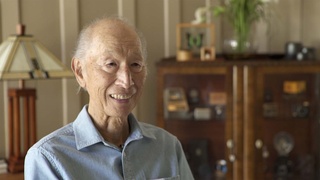Interviews
Feeling prejudice while looking for jobs
I went one year to junior college, but – and I enjoyed it very much – I got accepted to UC Berkeley, but then my parents said, “You know there’s not much future to go college,” – because you either had to become a doctor or dentist and work amongst the community, it was even difficult to get civil service jobs.
And I was quite good and I enjoyed repairing cars, driving them, “so why don’t you go to auto-mechanic school?” So, I went, learned the mechanic’s trade, and even then we felt prejudice because we couldn’t join the union. So you’re obliged to work in Japanese service stations or garages, which I did. I must confess it was rather boring. I was no future, perhaps someday I’d run a service station, or a garage, or something. But then the drafts came in 1940 and “wow!” (laugh)
Date: January 3, 2015
Location: California, US
Interviewer: Lily Anne Y. Welty Tamai
Contributed by: Watase Media Arts Center, Japanese American National Museum





